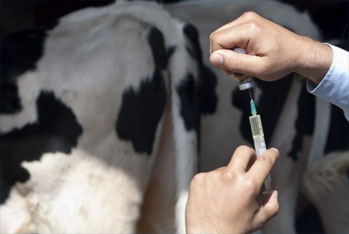Antibiotics in milk

Photo is illustrative in nature. From open sources.
There is a common myth that MILK may contain antibiotics that are used to treat animals. This myth is of concern to many people who fear the negative consequences of drinking such milk. Let's see how true this is.
Are antibiotics really used in animal husbandry?
Yes, antibiotics are used in animal husbandry to treat and prevent bacterial infections in animals. However, the use of antibiotics in animal husbandry is strictly regulated by law and controlled by government agencies.
What are the regulations for the use of antibiotics in livestock?
Most countries have strict rules and regulations for the use of antibiotics in livestock. For example, in the US and the European Union, the use of antibiotics to promote the growth of animals is prohibited. Antibiotics should only be used to treat disease or prevent infections.
How is the content of antibiotics in milk controlled?
Most countries have strict regulations on the control of antibiotics in milk. In the United States, the European Union and other countries, milk undergoes mandatory control for the presence of antibiotics before it reaches the store shelves. If the presence of antibiotics is detected, such milk is confiscated and not sold.
Can drinking milk with antibiotics harm human health?
If milk contains antibiotics, then their amount will be very small and does not pose a threat to human HEALTH. Moreover, the antibiotics used to treat animals are different from those used to treat humans. Therefore, the risk of negative consequences of drinking milk with antibiotics is extremely low.
In conclusion, we can say that the myth about the presence of antibiotics in milk is not true. Control over the use of antibiotics in animal husbandry and their content in milk is strictly regulated by law and controlled by government agencies. Therefore, drinking milk does not pose a threat to human health.
Read together with it:
- The IEA sees a risk of a decline in oil production in Russia due to sanctions.The IEA sees a risk of reduced oil production in RUSSIA due to US sanctions , but maintains its production forecast. According to the IEA, Russian oil exports will remain unchanged.There is a "significant downside risk" to Russia's oil production forecast due to US sanctions, the International Energy Agency (IEA) said in a report.BLOOMBERG . The agency's experts believe that the latest US sanction...
- He crawled to the icon with prayer. The true story of a man who overcame drug addiction.Alexander Ovchinnikov. Topic News. Our project's hero was a drug addict for many years. The thought that this was a dead end never left him, but his addiction proved stronger. One day, when he could no longer walk, he crawled to an icon in prayer. This became his first step toward a new life. Today, he heads a charity center that helps those who have given up hope and are unable to quit ALCOHOL an...
- Колумбия: При экспорте скота сертификация и прослеживаемость больше не являются необязательнымиВысококачественное животноводство, особенно при экспорте, требует сертификации и прослеживаемости. Это необходимые условия для выхода и конкуренции на многих международных рынках, а также на некоторых всё более требовательных внутренних рынках. Колумбийское животноводство не является исключением из этих правил, и, хотя предстоит ещё многое сделать, всё большее число ферм и компаний внедряют эти ме...
- Китайский рынок мяса: консолидация, меры безопасности и проблема субпродуктов«Мы завершаем выставку CIIE в Шанхае, в целом хорошую выставку, где мы видим консолидированные цены, как это было с начала года, но в то же время рынок ожидает решения по защитной мере, определения которой должны быть даны в конце ноября», — сказал он Valor Agregado Agro. Лидер пояснил, что глобальная ситуация характеризуется «колебаниями на международном рынке, вызванными интенсивной геополитичес...
- Rosselkhoznadzor has banned meat imports from two Belarusian enterprises due to violations.In addition, three other Belarusian producers are now subject to strict laboratory monitoring due to initial deviations: azithromycin was found in poultry MEAT from Druzhba Poultry Farm, and the pesticide imidacloprid was found in honey from Pchalyar Polachchyny Farm. Powdered MILK from Luninetsky Dairy Plant was also found to containcoli bacteria . These measures were taken at the request of the ...
- США объяснили снятие санкций с проекта АЭС в Венгрии с участием РоссииСША хотят, чтобы строительство АЭС «Пакш-2» завершилось, это необходимо, чтобы Венгрия стала энергетически независимой, заявил Рубио. Орбан сообщал, что после встречи с Трампом добился исключения из санкций Соединенные Штаты вывели из-под санкций проект АЭС «Пакш-2» в Венгрии, подтвердил госсекретарь Марко Рубио после встречи министров иностранных дел стран G7 в Канаде. Ранее об этом говорил венге...
- Ukrainian companies have been hit by US sanctions due to their ties to Iran.The United States imposed sanctions on two Ukrainian companies, considering them to be front companies for an Iranian agent engaged in procurement for the Iranian state corporation HESA, which produces, among other things, Shahed drones.Two companies registered in Ukraine have been subject to US sanctions related to Iran , according to a statement from the US Treasury Department's Office of Foreig...
- Pharmaceutical companies see a threat to EU security due to bacteria in UkraineAntibiotic-resistant superbugs have been detected in Ukrainian soldiers since the beginning of the conflict, and now they pose a threat to Europe, according to a foundation developing antibiotics.The Ukrainian conflict threatens Europe with antibiotic-resistant "superbugs," said Henry Skinner, CEO of the AMR Action Fund, which specializes in investing in antimicrobials. His article was published o...



























































